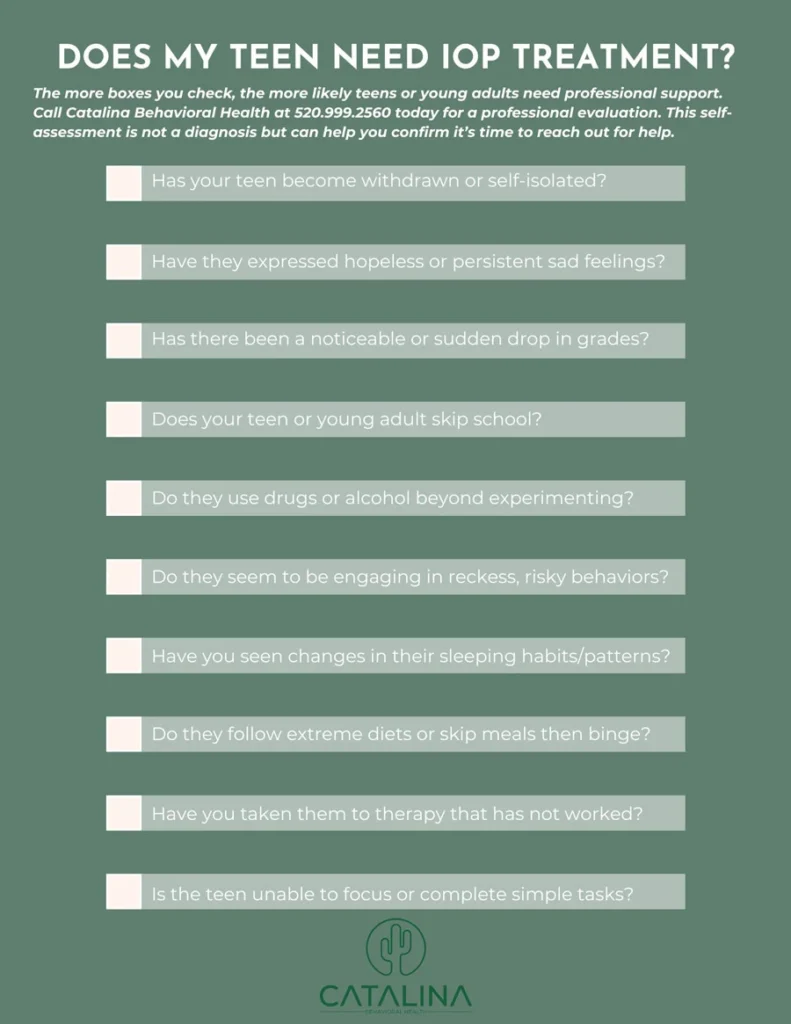Find Intensive Outpatient Support for Adolescents at Catalina
The National Institute on Mental Illness (NAMI) reveals a statistic that should be eye-opening to every American: 1 child out of 6 under 17 experiences mental health disorders per year. What does that mean? Picture your child’s classroom, which may have around 25 students. Four of those children have mental health issues, perhaps already diagnosed, but maybe not. This illustration shows the critical need IOP for teens across the nation.
What’s more, the same NAMI resource indicates that 50% of all lifelong mental health symptoms develop by age 14, and 75% appear by age 24. But the most alarming trend NAMI reports is how suicide is the second leading cause of death of children aged 10 to 14.
That’s where Catalina Behavioral Health comes in. Through our Artemis Adolescent Treatment Center, Catalina proudly offers an intensive outpatient program (IOP) for teens in Tucson, Arizona.
We encourage you to keep reading if you are a parent or teen who needs mental health treatment in a structured and supportive environment.
Get Confidential Trauma and Mental Health Assessment
The Benefits of an Intensive Outpatient Program for Teen Mental Health
An intensive outpatient program (IOP) is often the right treatment program to provide mental health support for teenagers and young adults. The evidence-based treatment modalities provide personalized care and allow them to receive comprehensive care several times per week.
Here are the most compelling reasons to attend adolescent IOP treatment:
IOP Treatment is Flexible Enough to Fit a Teen’s Daily Life
Unlike the full-time nature on inpatient treatment programs, IOPs are best for allowing teens to follow the comfort of their daily routines. They attend school during the day and therapy sessions in the evening. At night, they enjoy sleeping at home with their loved ones.
IOPs Offer a Holistic Approach to Mental Health Treatment

IOPs at Catalina Behavioral Health are highly structured treatment programs. They include therapeutic modalities including:
- Individual therapy sessions
- Group therapy and peer support
- Family therapy sessions
- Medication management
- Treating co-occurring substance use disorder, if applicable
- Individual and family support by a skilled interdisciplinary team
Catalina’s IOP treatment programs always consider the individual’s well-being to address all mental health challenges.
An Intensive Outpatient Program Reduces Isolation
Teens experiencing mental health conditions often self-isolate from their peers to avoid bullying. They may drop out of clubs and extracurricular activities or start cutting school completely. This scenario happens because they haven’t fully developed the social skills or coping mechanisms to deal with adversity. Teens don’t understand that loneliness leads them to ever-worsening mental health issues.
Coming to therapy sessions means they’ll receive group support in a structured environment. Our counselors will guide them through exercises to learn appropriate coping skills for the future.
IOP Treatment Addresses Multiple Conditions and Co-Occurring Disorders
An intensive outpatient program (IOP) helps improve many mental and behavioral health challenges:
- Mood disorders, including bipolar disorder
- Eating disorders
- Substance use disorder
- Depression
- Anxiety and panic disorders
- Trauma and stress-related conditions
Our treatment facility employs highly qualified professionals who provide support services for any one or more of the above conditions.
Signs a Teen or Young Adult Needs an Intensive Outpatient Program

Have you wondered if your teenager or young adult’s behavioral or mental health issues will disappear as they mature? While that can happen, it often does not. Untreated behavioral disorders in teens can escalate and lead to worsening symptoms.
Here are some of the signs parents and guardians should know:
- Behavioral changes: Withdrawing from once-loved activities, acting out, aggression or irritability, leaving old friends behind for new friends you don’t know.
- Emotional outbursts or distress: Frequent mood swings that occur more often or more intensely than typical, constantly sad or anxious; expressions of hopelessness.
- Worsening grades: Grades can fluctuate, but when an A student suddenly receives all Ds or Fs, it can be a sign the teenager needs more than just academic support. They may be unable to focus on the material due to their mental health decline.
- Substance abuse: You may see signs that the teenager has experimented with drugs or alcohol. Seeing these signs repeatedly or frequently can reveal a dependence on substances as a coping tool. This can quickly become an addiction.
These signs can be hard to spot at first, and drug testing teens or adolescent children can be problematic as well.
Parents of teens know that this can be a time of raging hormones and evolving behavior. But when typical experimentation or moodiness becomes atypical, seeking a professional evaluation becomes critical.
Self-assessment: Does Your Teen Need Professional Mental Health Support?
Does your teen need the structured treatment they’ll receive from an intensive outpatient program? This checklist can help you determine your next steps. The more checks on the sheet, the more beneficial an IOP will probably be.
Get Accredited Treatment Programs at Catalina
The Intensive Outpatient Program (IOP) Treatment Process
We can all agree that young adults and teens experiencing mental illnesses benefit from intensive outpatient program treatment programs.
Have you wondered why our evidence-based therapies are so effective? Keeping in mind that each teenager will have individualized treatment goals, here are more details about treatment options teens may experience at Catalina:
Individual Therapy for Teens and Young Adults

Teens and young adults with mental or behavioral health challenges need more structure than their peers. At Catalina, all treatment plans are predictable and always include individual therapy with a licensed therapist.
The type of therapy program will depend on individual needs. Some treatments clients experience include:
- Cognitive behavioral therapy (CBT)
- Dialectical behavior therapy (DBT)
- Motivational interviewing (MI)
Our team also recognizes that some need more frequent therapy sessions than their peers and will adjust their treatment plans accordingly.
Medical Detox for Substance Use Disorder (SUD)
Teens who struggle with behavioral health have often started to drink alcohol or use drugs to cope with the pain of their disorder. All Catalina clients must complete a medical detox. This process is key to addressing substance use disorder. It helps the body shed any substances before starting an intensive outpatient, partial hospitalization program, or similar treatment options.
The nursing staff keeps close tabs on the client’s well-being during medical detoxification. Detoxing with Catalina will ensure a safe and smooth end to substance use.
Group Therapy Sessions Build Interpersonal Effectiveness
Teens work with peers who understand their struggles in group therapy sessions. Being among others who have experienced similar challenges, including mood disorders or anxiety attacks, give them a safe space to open up about their feelings.
Working in group sessions allows them to build communication skills while discussing shared experiences. A specialty therapist guides group therapy discussions and helps them learn skills related to listening, setting boundaries, and responding appropriately.
Family Therapy Creates More Support After Therapy

Family sessions are critical to lasting recovery. Parents, siblings, and grandparents must provide a supportive environment after the teen completes the intensive outpatient program (IOP). It’s as important that families have appropriate coping skills when dealing with young adults with mental health concerns.
In cases where family involvement has led to trauma or harm, therapists will facilitate meaningful conversations. Family therapy can often be as much for the family member as for the young adults in our therapy program.
Aftercare Planning for Lasting Recovery
Teens and young adults leave treatment with a roadmap that will help them stay on track after the program – their aftercare plan. This phase of adolescent IOP treatment is critical because it helps them reflect on what they need to avoid future threats to their mental health or trigger a relapse to past behaviors.
For instance, we recommend teens attend SMART Recovery Programs for Teens’ online sessions once per week. The free program gears the content to 13- to 17-year-olds with behavioral health issues. Participants face a series of challenges, including SUDs, eating disorders, obsessive behaviors, or any unhealthy habits.
Another well-known option for peer support that accommodates young people are the venerable AA (Alcoholics Anonymous) and NA (Narcotics Anonymous) programs, which often have more in-person options, such as AA meetings for young people and beginners, than SMART Recovery. The two approaches do not fundamentally conflict, and many clients have attended both types of meetings.
We also help them consider what people to contact in case of a triggering event, as well as places and people to avoid. Pulling together this information before leaving the intensive outpatient program is key to protecting their well-being.
We Help Make Sense of Your Insurance Coverage
Don’t let fear of costs hold you back from getting treatment for the teens or young adults in your family. We accept most major insurance providers, including plans from the following carriers:
- Aetna
- AHCCCS (Arizona Medicaid)
- Anthem BlueCross
- BlueShield
- Cigna
- First Health
- GEHA
- Humana
- TRICARE
- United HealthCare
That’s a brief overview, and we work with many other insurers and accept self-pay clients. Reach out now for additional details and prompt
If calling the insurer to sort out the details seems overwhelming, let us do it for you. We’re experts at helping you get the most out of your benefits, sometimes receiving approval for 100% covered costs.
With a mental health diagnosis, most teen treatment and recovery programs are covered. That includes an intensive outpatient program, partial hospitalization program, or even specific treatments like dialectical behavior therapy (DBT), according to individual needs. All that language can sound confusing, but we’re here to help!
Call our insurance team today to learn more information about how we can get your loved one’s program pre-authorized (if this is needed) and give you peace of mind that your child is getting the care they need optimally covered.
Up To 100% of Rehab Costs Covered By Insurance
Call Catalina for Your Teen’s Intensive Outpatient Program
An intensive outpatient program allows teens to attend treatment several times per week while balancing a school workload and family time. It’s an excellent solution for those needing professional intervention for behavioral health symptoms.
Call us now to reserve space in our program. All calls are strictly confidential, so please reach out in confidence today to get help for the young adult who is struggling.





